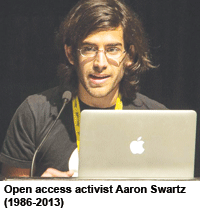The suicide of a radical advocate of open access to academic research has elevated the topic to the forefront of conversation in the US, and could ultimately widen the availability of documents and prompt copyright reform.
 The number of academic papers open to all without charge has increased rapidly in recent years, even before Aaron Swartz (26), an open-access activist, was found dead in his Brooklyn apartment. The co-founder of Reddit, the social news and entertainment website, Swartz was set to face trial in a federal court in Boston in April. He had been charged with using the Massachusetts Institute of Technology’s network to illegally download some 4 million documents from the JSTOR archive, a non-profit portal that charges fees for access to scholarly journal articles. The act was allegedly perpetrated in 2011.
The number of academic papers open to all without charge has increased rapidly in recent years, even before Aaron Swartz (26), an open-access activist, was found dead in his Brooklyn apartment. The co-founder of Reddit, the social news and entertainment website, Swartz was set to face trial in a federal court in Boston in April. He had been charged with using the Massachusetts Institute of Technology’s network to illegally download some 4 million documents from the JSTOR archive, a non-profit portal that charges fees for access to scholarly journal articles. The act was allegedly perpetrated in 2011.
In tribute, thousands of academics worldwide responded to Swartz’s death by posting their work online for free. Other supporters illegally downloaded further journal articles from JSTOR, and the hacker group Anonymous briefly disabled the MIT homepage in remembrance. But it is the saga’s long-term effects that are likely to be the most dramatic. In the statement that it used to replace the MIT homepage, Anonymous joined a chorus of criticism calling for the reform of copyright and computer-crime laws.
The university itself, which has been criticised for its handling of the case, set up a committee to review its actions. And there are prospects that a proposed law which would require the results of government-funded research to be published without charge, introduced annually since 2006 without success, may now acquire fresh momentum.
The number of scholarly papers worldwide to which access is unrestricted rose ten-fold to nearly 200,000 a year between 1999 and 2009, according to the open-access journal PLOS One. That increase has been propelled in part by the desire of authors to maximise the impact of their research and the number of citations it attracts, often a factor in tenure or promotion. “There is a definite mindshift going on in academic writing. It’s no longer ‘just get published’: it’s ‘get published, but also get seen everywhere’,” says Aaron Dobbs, electronic resources librarian at Shippensburg University and councillor-at-large at the American Library Association.
But widening access further is a complex issue: it is in the interest of universities with academic presses to charge for monographs, and private publishers of academic journals profit by controlling access. Some for-profit journals also benefit professional associations, which depend on their cash to subsidise conferences and other activities. And even non-profit journals face costs for salaries, printing and digitising content.
“The problem with a tragedy, not just this one, is that people rightly react emotionally,” says Cathy Davidson, co-director of the PhD Lab in Digital Knowledge at Duke University and co-author of The Future of Thinking: Learning Institutions in a Digital Age (2010). “That is not always the best way to clearly unravel a complicated and disastrous legal situation... (But) this might be one of those iconic moments that make people aware that something is wrong.”
Universities shakeout prediction
A world-renowned physics lecturer believes that free online university courses will force the US’ less prestigious higher education institutions — which he calls “trash” — out of business within 20 years. Walter Lewin, emeritus professor of physics at the Massachusetts Institute of Technology, told Times Higher Education that students will desert weak universities in favour of completing online courses from more respected institutions. Prof. Lewin predicts “that a fair fraction of the very bad universities in the US will disappear. It may take ten years, it may take 20 years, but that is going to happen.”
The Dutch astrophysicist’s electricity and magnetism lectures have become the latest massive open online course to be offered by edX, the Mooc (massive open online courses) platform run by MIT and Harvard. He says that as time passes, students will be smart enough to “make their own package” by taking courses on edX and other Mooc providers instead of accepting places at less prestigious universities and colleges.
Prof. Lewin adds that even the best universities would start to reduce the number of degree courses taught on campus in favour of delivering them online. “What you will see... is that perhaps at MIT — if I shoot a little bit from the hip — it’s possible that ten years from now, maybe there will be 10 percent of courses that we will no longer teach in the classroom.”
Prof. Lewin (77) has already cemented for himself a reputation for online pedagogy. He has produced 105 online lectures viewed by 2 million people annually, and has been declared a “web star” by The New York Times.
(Excerpted and adapted from Times Higher Education)